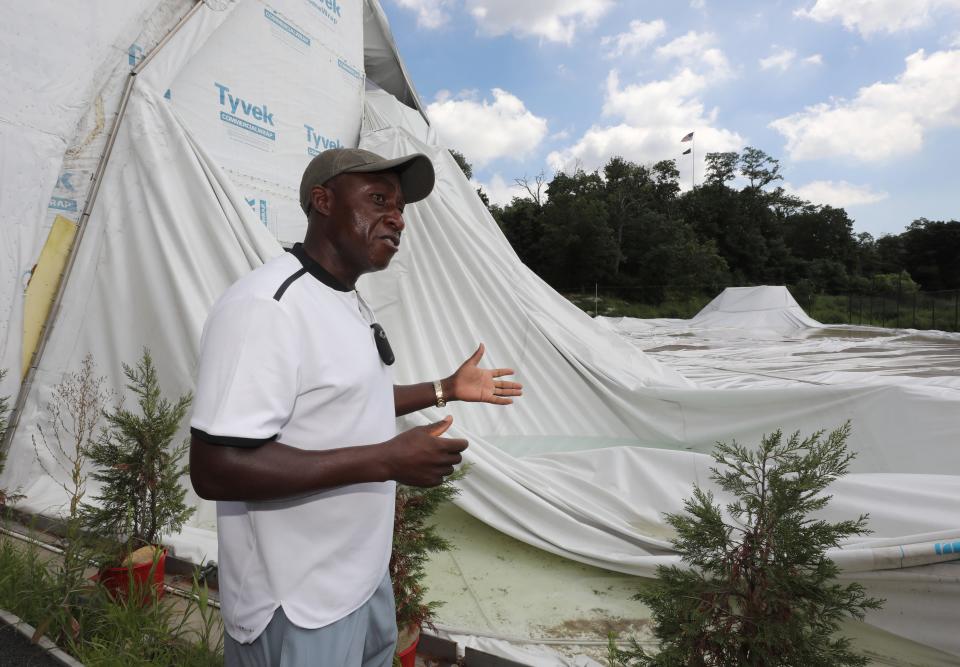Mount Vernon found liable over the infamous destruction of Memorial Field tennis bubble
A jury on Tuesday found Mount Vernon liable for breach of contract for the infamous middle-of-the-night destruction of the tennis bubble at Memorial Field in 2018.

The verdict following a two-week trial in state Supreme Court in White Plains paves the way for Kela Tennis Inc. to seek as much as $16 million in damages when the jury reconvenes next week.
The removal of the bubble on the orders of then-Mayor Richard Thomas effectively ruined the company, whose operators had stopped paying rent and spent $365,000 on things the city was supposed to provide after the city failed to complete a clubhouse that was central to the businesses Kela Simunyola and his wife and daughter envisioned for the tennis center.
Simunyola grew up in Zambia and became a top tennis coach in Westchester after coming to the United States to attend Concordia College in Bronxville.
How the bubble came down
Shortly after midnight on June 1, contractor Michael Figueroa and his employees deflated the $600,000 rented bubble without any of the normal procedures for taking it down. Figueroa had been accompanied by several police officers who were there to make sure no one interfered.
Tennis bubble: Memorial Field has reopened, but tennis bubble battle rages as $16M lawsuit nears trial
James Borkowski, Kela's lawyer, hailed the verdict. He said that although the situation was caused by Thomas, the verdict should be a wake-up call for current Mayor Shawyn Patterson Howard to "show some leadership" and have a serious discussion about settling the case.
But Marc Oxman, the lawyer representing the city, said the verdict was "disappointing" and would almost certainly be appealed. He said the city was not allowed to present one of its primary defenses: that the contract was null and void because a 2008 intermunicipal agreement with Westchester County to restore the long dilapidated Memorial Field prohibited the city from entering into any other contracts for programs not included in the county agreement.
State Supreme Court Justice Lewis Lubell had ruled that would not be an issue for the jury to consider.
The agreement for the county to fund the reconstruction of the field, track and grandstands was shepherded by then-Mayor Clinton Young. But when Ernie Davis, a tennis enthusiast, returned to the mayor's office in 2012, he reshaped the plan to include an expended tennis footprint. In 2015, Kela Tennis Inc. was given a 15-year lease to run the tennis center.
Jurors found that Kela Tennis had a valid contract and that it was the city and not the company that breached the contract. It also found that the breach was not excusable, rejecting Oxman's argument that there were "serious environmental impediments" like the need to test and remove contaminated debris that forced the city's hand.
When the city had not provided what it promised in the first six months of the contract, it was amended in December 2015, just before Davis left office, to cut in half how much Kela had to pay each month. But over the next two years, little work got done and city officials told the company not to make monthly payments.
Key testimony
The key testimony in the trial likely came from the city's current elected comptroller, the Rev. Darren Morton, who was recreation commissioner helping to oversee the work on Memorial Field during the Davis and Thomas administrations. He had been kept out of the loop as Thomas and corporation counsel Lawrence Porcari pushed for Kela's removal from Memorial Field.
He said Kela Tennis had been told not to continue making rent payments as the city had not lived up to its end of the contract.
In early 2018, Thomas hoped to make progress on Memorial Field and asked Kela Tennis if the courts could be moved back on the property to ensure there would be room for an 8-lane track when Memorial Field was rebuilt.
When Simunyola refused, concerned that new promises to get the work done on the tennis center were unlikely to be fulfilled, Borkowski said that set in motion the plan to remove Kela Tennis "at any cost."
Borkowski called the process "persuasion, deception and destruction," saying the administration kept harping on the unpaid rent that didn't really have to be paid.
Only after the fact did the city start citing issues like the danger posed by crumbling grandstands and the need to test and remove potentially contaminated debris that Davis had allowed to be dumped on the field.
Oxman argued that there was no deadline in the lease agreement for when the clubhouse had to be built and no provision that made lease payments contingent on the completion of the clubhouse.
But Borkowski ridiculed that in his summation, saying the suggestion Kela still should have paid amounted to telling them, "You do your thing but we don't have to do ours. Does that seem reasonable? Does that seem fair?"
Oxman conceded that the work the city did on the clubhouse was slow and "not particularly good" and that removal of the bubble "may have been heavy-handed." But the removal did not violate how breaches of the contract had to be handled, he said.
"Denial of the claim may seem harsh, but the jury role is to strictly study the contract," he said.
Borkowski cited emails from Ralph Uzzi, the public works commissioner, to Thomas, deriding the work that had been done on the tennis center. He said the project had died of "incompetence, neglect and malfeasance" and that it bordered on criminal neglect.
"If that's not a breach (of contract), I don't know what is," Borkowski told the jury.
This article originally appeared on Rockland/Westchester Journal News: Tennis bubble: Kela Tennis wins against Mount Vernon over deflation

